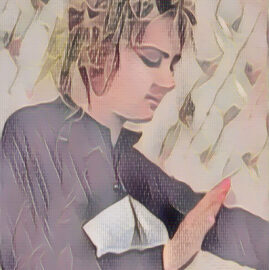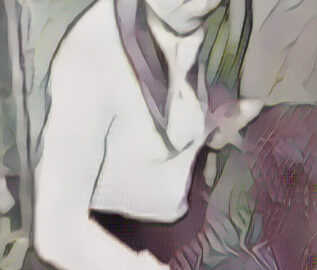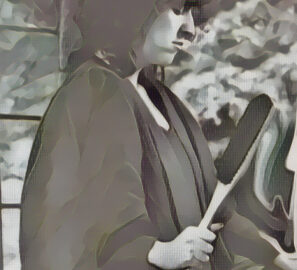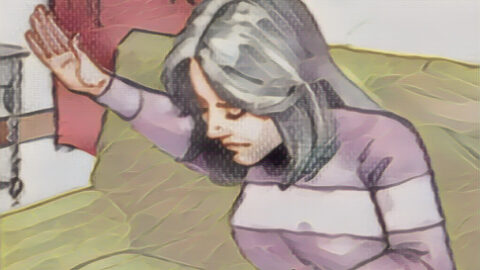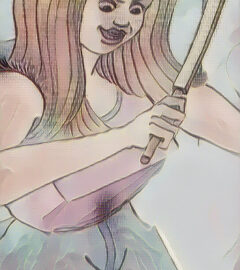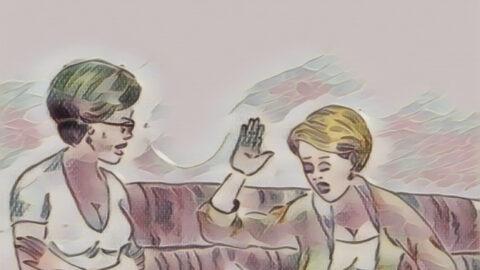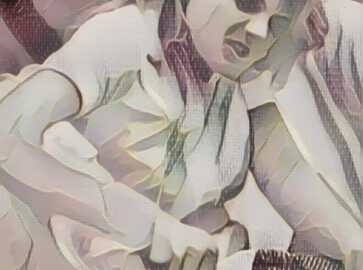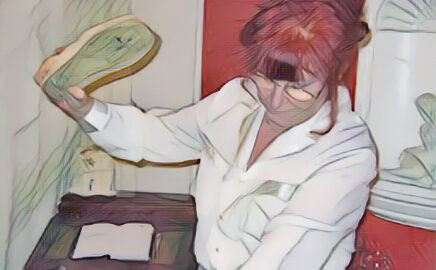(gap: 2s) There are certain tales from one’s youth that linger in the mind like the scent of toffee in a sweet shop—rich, sticky, and impossible to forget. A recent story about a lady named Mrs Sweets sent me tumbling back through the years to another formidable woman, the owner of the sweet shop in the next town over. Her name was Mrs Thompson, and her shop was a magical place, tucked inside a grand, echoing building that also housed the town’s cinema and a tiny milkshake bar. The air always seemed tinged with the mingled aromas of popcorn, sugar, and the faintest whiff of floor polish. I suspect each business was run separately, but they huddled together under one roof, as if for warmth against the draughts that whistled through the old brickwork.
Mrs Thompson herself was a woman of indeterminate age—perhaps in her forties at the time, though to us children she seemed as ancient and unyielding as a granite monument. She was tall and broad-shouldered, with a formidable bosom and arms as sturdy as rolling pins. Her face, framed by a helmet of iron-grey hair always pinned in a no-nonsense bun, was sharp and angular, with eyes like polished marbles—keen, unblinking, and capable of seeing straight through any fib. Her lips, usually pursed in concentration, could break into a smile so unexpectedly warm that it felt like the sun coming out after a thunderstorm. She wore sensible shoes, thick stockings, and a starched apron, and moved with the brisk efficiency of a general marshaling her troops. Her voice, when she chose to use it, could cut through the din of a dozen children as easily as a knife through butter.
She had seven children, a veritable army ranging from three years younger than myself to a full seventeen years older. Henry, her middle son, was my age and my companion in all manner of mischief. Henry was a wiry, freckle-faced boy with a mop of unruly chestnut hair that stuck out in all directions, as if permanently electrified by excitement. His eyes, a mischievous shade of green, sparkled with the promise of trouble, and his grin—wide, gap-toothed, and utterly infectious—could charm the birds from the trees. He was quick-witted, endlessly inventive, and possessed a reckless courage that bordered on the foolhardy. Because of our friendship, I was a frequent visitor to both the sweet shop and the Thompson household, and Mrs Thompson, in her rare moments of indulgence, would slip me an extra humbug or two, her eyes twinkling as if we shared a delicious secret.
As for myself, Thomas, I was a rather timid, bookish child, with sandy hair that never quite lay flat and a tendency to blush at the slightest provocation. My spectacles, perpetually smudged, perched precariously on the end of my nose, and my knees were always scuffed from some ill-advised adventure. I was cautious where Henry was bold, thoughtful where he was impulsive, and yet, in his company, I found myself swept along by the current of his wild ideas.
It was, as it so often was, Henry’s idea that landed us in trouble. One Saturday morning, the sort that dawns bright and full of promise, we were meant to go to the flicks. But our pockets were as empty as a sweet jar after a birthday party. The thought of watching a film without a paper bag of lemon sherbets was unthinkable. If we’d asked Mrs Thompson, I’m sure she would have obliged, but Henry, with the reckless logic of a boy who has grown up surrounded by sweets, suggested we simply help ourselves from the display at the front of the counter. “They’re practically mine anyway,” he reasoned, puffing out his chest. I hesitated, my heart thumping, but the lure of forbidden sugar was too strong. We snatched a handful each, our fingers trembling with excitement and guilt.
The universe, as it so often does, conspired against us. Mrs Thompson appeared as if conjured by magic, her shadow falling across us like a thundercloud. She didn’t shout. Instead, she fixed us with a look so icy it could have frozen the lemonade in the milkshake bar. “Put those sweets back and go on home,” she said, her voice low and dangerous. “Thomas, you can use our telephone to let your mother know you’ll be home late tonight. Henry, tell your father you’re to stay in your bedroom until I get home.” The words hung in the air, heavy as lead.
Crestfallen, we trudged back to Henry’s house, the weight of our shame pressing down on us. Henry’s father, Mr Thompson, was a gentle, absent-minded man with thinning hair the colour of weak tea and spectacles that always seemed to be sliding down his nose. He wore cardigans with sagging pockets and had a habit of humming tunelessly to himself as he pottered about the house. His eyes, soft and watery, rarely betrayed any strong emotion, and he greeted our confession with a distracted nod, as if we had merely told him the weather forecast. We were banished to Henry’s bedroom, a cramped space littered with comics, football boots, and the faint, comforting smell of old socks. Malcolm, Henry’s older brother, was out with friends, so we had the room—and our guilt—to ourselves. The hours crawled by, each tick of the clock a reminder of our impending doom. My stomach churned with anxiety and hunger in equal measure.
I clung to the hope that being kept in was the punishment itself. When I voiced this, Henry let out a hollow laugh. “No, Mother’s going to give us a belting.” The word sent a shiver down my spine. I knew, as Henry did, that “belting” didn’t always mean a literal belt, but rather a thorough smacking. My imagination ran wild, conjuring up every possible scenario, each more dreadful than the last. The anticipation was almost worse than the punishment itself.
At last, as the sun dipped low and the house filled with the comforting smells of dinner—roast potatoes, onions, and something sweet—Mrs Thompson returned. By then, Henry and I were ravenous, our stomachs growling like caged animals. But before we could even think of food, Mrs Thompson swept into the room, her presence filling the space. She closed the door with a soft click, sat down on Henry’s bed, and fixed us with a look that brooked no argument.
What followed was a scolding of epic proportions. Mrs Thompson’s voice, usually so brisk and businesslike, was now grave and full of disappointment. She spoke of trust, of right and wrong, of the pain we could have caused by stealing. Her words stung more than any smack could. I felt my eyes prick with tears, and when I glanced at Henry, I saw his face was wet too. We were both eight, but in that moment, we felt much smaller.
“Now it’s time to pay the piper. Thomas—here!” she commanded. My legs felt like jelly as I shuffled over. She guided me gently but firmly across her lap, my head spinning with dread. The bedspread smelled faintly of lavender and starch. Mrs Thompson’s hand, though soft from years of work, delivered a series of smacks that started out almost bearable, but quickly built into a fiery, stinging crescendo. Each slap echoed in the small room, and I couldn’t help but sob, the pain mingling with shame and regret. My bottom felt as if it were ablaze, and I wondered if I’d ever sit comfortably again.
As I lay there, I could hear Henry crying even before his turn had come, his wails louder than mine. I felt a strange, indignant sense of injustice—how could he be crying more than me when he hadn’t even been smacked yet? After what felt like an eternity—though it was probably only a dozen sharp smacks—Mrs Thompson let me up with a final, stinging slap to the back of my calf. I glanced down and saw a bright red handprint blooming beneath the hem of my shorts. Then it was Henry’s turn, and I watched, sniffling, as he received the same treatment. When it was over, Mrs Thompson’s sternness melted away, and she led us downstairs to dinner, as if nothing had happened.
When I finally made my way home, the evening shadows long and cool, I found my parents waiting. My mother, a petite woman with tightly curled hair and a face as soft as a peach, looked at me with wide, anxious eyes. She was gentle and quick to worry, her hands always fluttering like nervous birds. My father, by contrast, was tall and spare, with a bristling moustache and a voice that rumbled like distant thunder. His eyes, usually kind, were now clouded with disappointment. Before I could protest, Father bent me over the sofa and delivered a few swift strokes with his belt—sharp, but not unkind, more a punctuation mark to the day’s lesson. My bottom, already sore, throbbed anew, and I was sent to bed in disgrace, the events of the day swirling in my mind. Yet, as I lay there, the pain slowly faded, replaced by a strange sense of relief. I had paid the price, and tomorrow, the world would be bright and new once more.

























